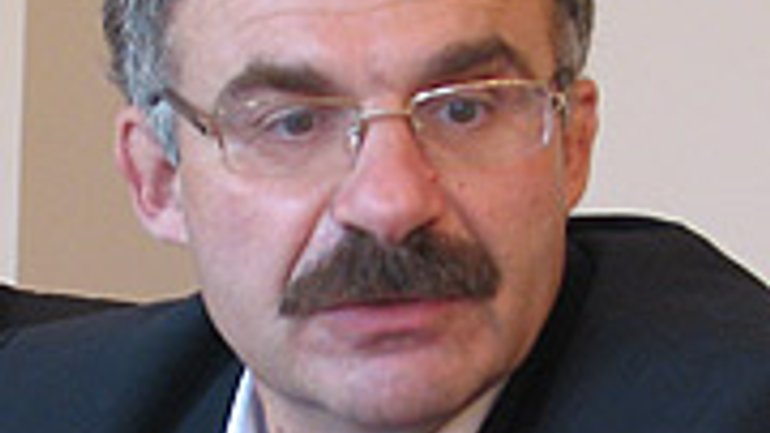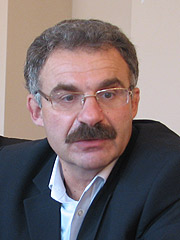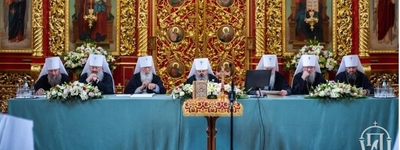October: On Lists and Expectations

 In general the disposition is as follows: close to three hundred clergy members (six of them, among others, were Orthodox hierarchs) registered as deputy candidates, as well as for city and village heads. The majority of them were Orthodox of the Moscow and Kyivan patriarchates. The minority were Autocephalous Orthodox Church, Charismatic, Pentecostal, and Baptist priests. Despite Canon 383 of the Code of Canons of the Eastern Churches, the prohibiting statute of the 23rd session of the Synod of Bishops of the Kyiv-Halych Metropolitanate (June 2004) and the unequivocal declarations of the head of the Ukrainian Greek Catholic Church Lubomyr Husar, a few Greek Catholic priests made it on the list.
In general the disposition is as follows: close to three hundred clergy members (six of them, among others, were Orthodox hierarchs) registered as deputy candidates, as well as for city and village heads. The majority of them were Orthodox of the Moscow and Kyivan patriarchates. The minority were Autocephalous Orthodox Church, Charismatic, Pentecostal, and Baptist priests. Despite Canon 383 of the Code of Canons of the Eastern Churches, the prohibiting statute of the 23rd session of the Synod of Bishops of the Kyiv-Halych Metropolitanate (June 2004) and the unequivocal declarations of the head of the Ukrainian Greek Catholic Church Lubomyr Husar, a few Greek Catholic priests made it on the list.
Priests from the Party of Regions ran for offices especially actively. In a few oblasts, the Svoboda party also willingly engaged in this – in its list of candidates for the Vinnytsia oblast council, for example, there were 14 clergymen of the UOC-KP led by the bishop. Overall, the diversity of the parties, to which individual priests were adherents, is impressive: the Greens and Communists and UDAR and more obscure parties.
In principle, there is nothing new in this: from the second half of the 1990s priests have run for all levels local councils, and many times successfully (in 2002, for example, over 180 of them became deputies). It was understood from then that neither the Rights of the Great Universal Councils, which did not allow clerics to take on secular duties, nor later documents of the Orthodox and Catholic Churches, which disapprovingly regard the participation of clergy in government bodies, prevented it. The norm of the Law of Ukraine “On Freedom of Conscience and Religious Organizations” did not change, which definitely proclaimed that religious organizations “do not nominate candidates for bodies of the state government, do not participate in agitation or finance election campaigns of candidates to these bodies.” Besides, mentioning this is not deemed as appropriate. And bishops who bless priests for election races and announce that such and such protohierarch will be a representative in the oblast, city, or district council, don’t even try to make it look as if a “regular citizen” is running for office.
The difference between this year’s local elections is, maybe, that they are taking place for the first time not at the same time as the parliamentary elections and thus it draws more attention then before; and, of course, that candidates for oblast, district, and city councils are being nominated by parties. Thus, political organizations that just by etymology represent only a part of the society. Therefore the priests must specify the interests of what part they will defend, which they will ignore, and which they will fight against.
What the party wants from the clergy is understood. Soon it will be 20 years that Ukrainian politicians fight over how to direct the religious enthusiasm of their fellow citizens into “one correct” political channel so that the church is a “collective organizer and agitator,” and the priest is a leader of the party’s ideas. More precisely, one idea – who one should vote for. With this goal in mind a few political organizations in Ukraine call themselves “Christian.” Though few people don’t understand that, for example, the Christian Liberal Party is in no way Christian, or liberal, or even a party.
The ideal variant of priests’ participation in local elections for many parties is to decorate their lists, to snatch in such a way a few hundred, and better, a few thousand votes, and then later politely turn down the position of deputy. Having given the chance for others to enter the council who without a doubt are even more worthy people from the party’s list and who are convinced that they know better than the fathers how to distribute sovereignty and who should receive the right to manage objects of communal property.
What’s the motivation of the clergy? To protect their church and their parishes from local authorities and evildoers, to act against their rivals, to return once confiscated structures, to receive land, to strengthen their presence in the public sphere, to secure unhindered access to schools, “to beat out,” as one priest candidate honestly said, money for a church social project, not allow the privatization of not returnable church property, and so forth. (Of course, someone of the clergy will care for his business interests, or will lobby for others, someone will think of receiving two or three land plots, and someone who act out of vanity.) But this is not about them, but about the rather devoted and honest servants of the church. The motivation of which in no way differs from the one that incites businesspersons, heads of hospitals, school directors, business directors, and heads of oblast sports federations to run for local councils. Simply saying, using such a path to power these representatives of the church proclaim that the institute they represent does not different in any way from other social institutions and they run for local councils to defend the interests of their own corporations. One can understand them. They live in a country where the law is not one for all; it is completely committed to those who have positions of authority and very principled to those who lose this position. It’s not them, after all, who established the rules by which they play.
Only people who will choose clerics will place marks opposite their surnames because they believe in the church the most. And they believe in it not as a regular, though very important social establishment, but as an institute with a special mission, directed toward that which reaches beyond the daily routine. This does not mean at all, as Francois Mauriac write almost half a century ago, that love to Christ and hope in the arrival of His Kingdom makes Christians “distanced from experiences of humanity, from the dark daily work, which we call politics.” But this means, obviously, the readiness to introduce to politics and authority a dimension which in politics and in the government of Ukraine (and not only in it) is catastrophically missing. On paper all supposedly agree with this. But I didn’t hear anywhere that a priest deputy with prophetical anger exposed the abuses of his colleagues in his faction, reproached them for not fulfilling campaign promises, committed a breach of interest a community and would not allow their land or business to be stolen. To tirelessly appeal to the conscience of people who no longer steal, but literally rob the cities and villages of the country. Instead I heard something else: how priests in councils gradually, some with grinding and some rather smoothly, become cogs in the most smooth and reliable mechanism of our state machinery – the mechanism of corruption.
Is there hope that these elections will bring to local councils clergy who are entirely aware of the particularities of their calling? I have none. But more than ever I hope to be wrong.










